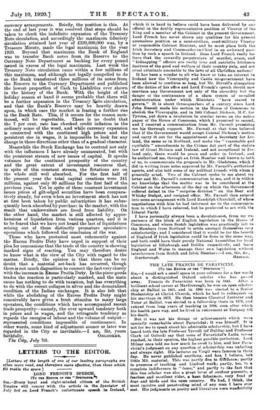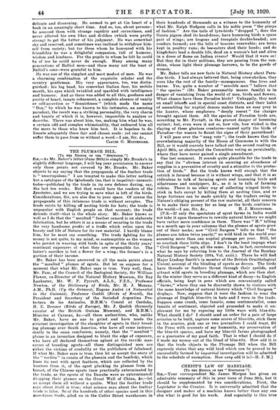THE LATE FRANCIS DE PARAVICINI.
[TO THE EDITOR OF THE " SPECTAT0111.")
would ask a small space in your columns for a few words about a distinguished Oxford scholar who has pa,.-ed away. Francis de Paravicini was born in 1843. After a brilliant school career at Marlborough, he won an open scholar- ship at Balliol in 1861, and in 1886 was elected to a senior Studentship at Christ Church, which he had to relinquish on his marriage in 1872. He then became Classical Lecturer and Tutor at Balliol, was elected to a fellowship there in 1878, and retired from long years of teaching in 1908, soon after which his health gave way, and he lived in retirement at Torquay till his death. But it was not his doings or achievements which were specially remarkable about Paravidni; it was himself. It is not for me to speak about his admirable scholarship, but I have heard both the late Professor Tyrrell (of Dublin) and Professor Clark (of Oxford) say that some of Paravicini's Latin verses reached, in their opinion, the highest possible perfection. Lord Milner once told me how much he owed to him, and how Para- vicini's judgment on any question of scholarship was unfailing and always right. His lectures on Virgil were famous in their, day. He never published anything, and has, I believe, left little MS. material. This was partly due to diffidence; partly to pressure of teaching and kindred work; partly, too, to a complete indifference to " fame," and partly to the fact that this fine scholar was also a great lover of outdoor pursuits, a fearless and excellent rider, a keen fisherman, very fond of dogs and birds and the open country. He had, I think, the most incisive and penetrating mind of any man I have ever met. His judgments on poetry and literature were wonderfully
delicate and discerning. He seemed to get at tae heart of a book in an amazingly short time. And so, too, ab.sut persons: he assessed them with strange rapidity and correctness, and never allowed his own likes and dislikes (which were pretty strong) to get the better of his judgment. He was somewhat shy and reserved, and sometimes was inclined to withdraw him- self fromfrom society; but for those whom he honoured with his friendship he was a delightful companion, full of humour, wisdom and kindness. For the pupils to whom he felt he could be of use he could never do enough. Many among many generations of Balliol men—and these many not the least of Balliol's sons—were grateful to him.
He was one of the simplest and most modest of men. He was a charming combination of the exquisite scholar and the country gentleman. His very appearance, too, was distin- guished: his big head, his somewhat Italian face, his mobile mouth, his eyes which twinkled and sparkled with intelligence and humour. And as there was added to all this, goodness and purity of heart, innate refinement, a complete absence of vanity or self-assertion or " donnishness " (which made the name "Don," by which he was known to his intimates, an amusing paradox), the result was a striking personality, the very charm and beauty of which it is, however, impossible to analyse or describe. There was about him, too, making him what he was, a certain odd and complex whimsicality, that endeared him all the more to those who knew him best. It is hopeless to de- lineate adequately these fair and chosen souls: yet one cannot suffer them to pass from us without a word.—I am, Sir, Sze., CLAUDE G. MONTEFIORE.



































 Previous page
Previous page